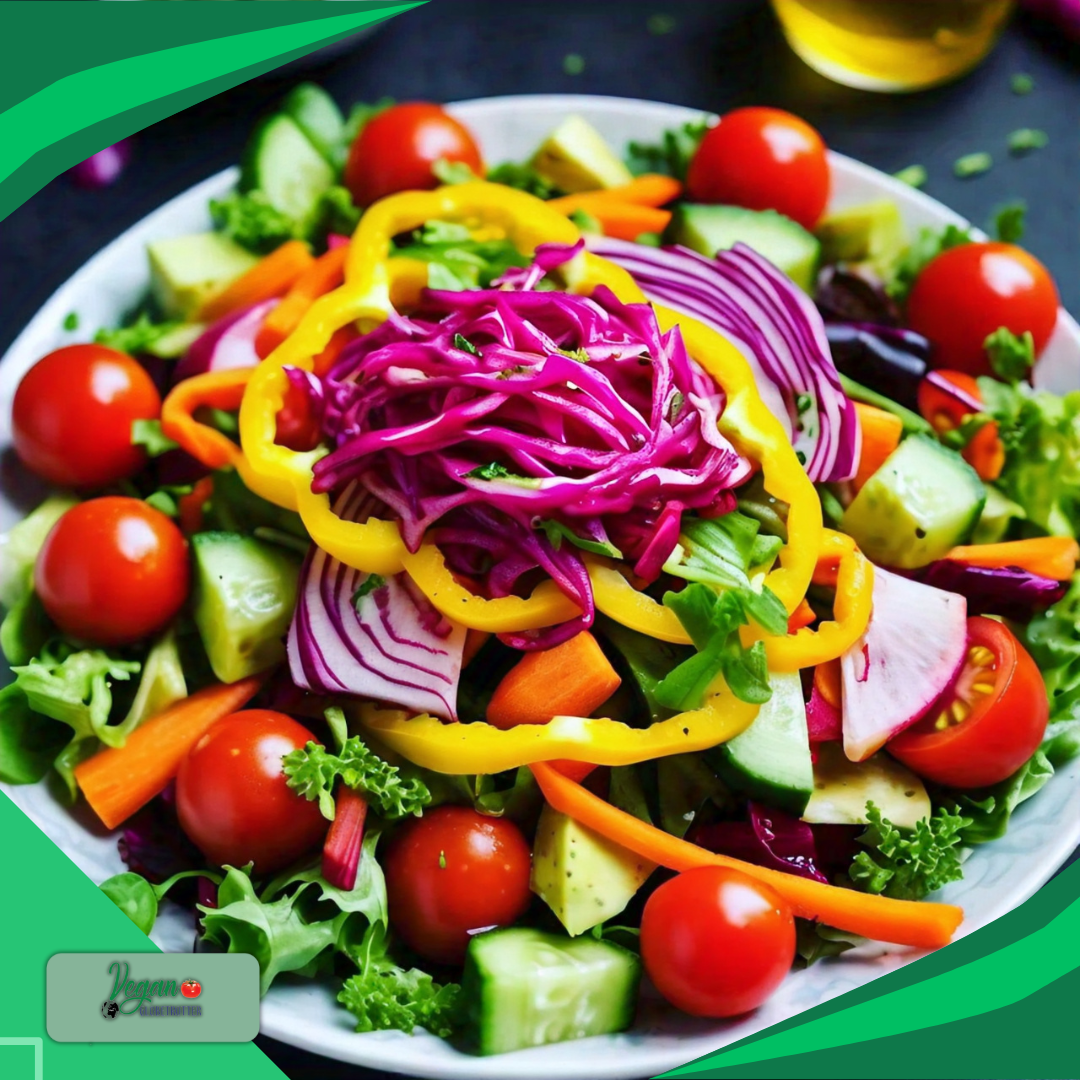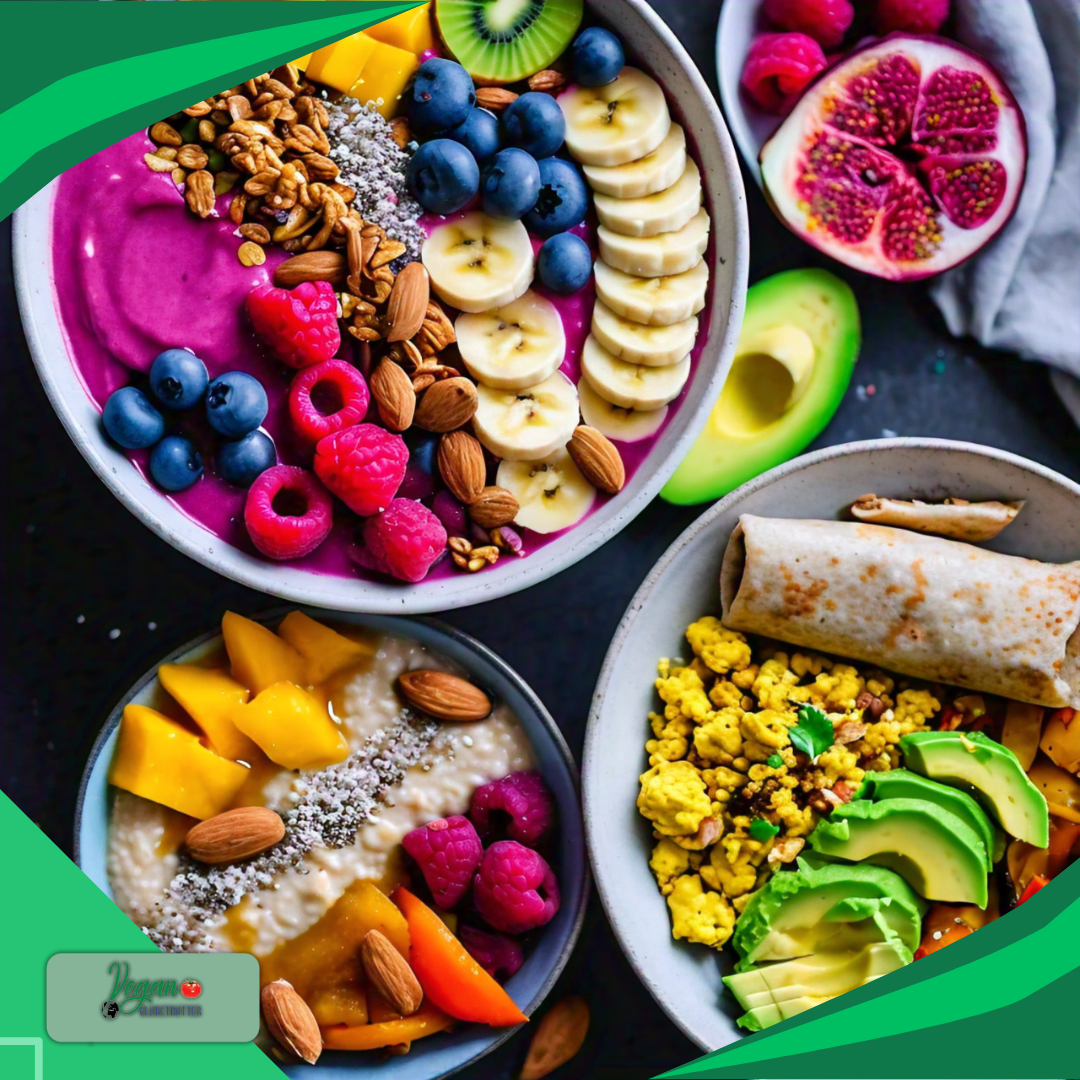Vegan Globetrotter is supported by our audience. When you purchase through one of our links, we may earn a small affiliate commission. As an Amazon Associate I earn from qualifying purchases. Your cost is not affected.
==================
Vegan Diet for Inflammation: Delicious Plant-Based Foods to Soothe Your Body

Are you tired of feeling achy and sluggish? A vegan diet might be the answer you’re looking for. Eating plant-based foods can help fight inflammation in your body, which is linked to many health issues. Choosing a vegan anti-inflammatory diet can improve your overall health by reducing pain and swelling in your body.
This way of eating focuses on fruits, veggies, whole grains, and healthy fats. These foods are packed with nutrients that help your body feel better. You might be wondering what to eat on a vegan diet for inflammation. Some great choices include colorful fruits and veggies, beans, nuts, and seeds.
Key Takeaways
- A vegan diet can help reduce inflammation by focusing on plant-based, nutrient-rich foods like fruits, vegetables, and whole grains.
- Avoiding processed foods and focusing on anti-inflammatory ingredients such as turmeric, ginger, and omega-3-rich flaxseeds can enhance health benefits.
- Consuming a variety of colorful fruits and vegetables provides antioxidants that fight inflammation and promote overall well-being.
- A balanced vegan diet with adequate protein and healthy fats supports muscle repair and reduces inflammation effectively.
- Staying consistent with a vegan diet can lead to long-term reductions in chronic inflammation and improvements in health markers.
Understanding Inflammation and Health

Differentiating Acute and Chronic Inflammation
Acute inflammation is your body’s normal response to injury or infection. It helps protect and heal you. Signs include redness, swelling, and pain. This type usually goes away once the threat is gone.
Chronic inflammation is different. It lasts for months or years. Your immune system stays active even when there’s no clear danger. This can damage healthy cells and organs over time. Causes of chronic inflammation:
- Untreated infections or injuries
- Autoimmune disorders
- Long-term exposure to irritants
- Lifestyle factors like poor diet or lack of exercise
How Chronic Inflammation Affects the Body
Chronic inflammation can harm your health in many ways. It’s linked to several serious conditions:
- Heart disease.
- Diabetes.
- Cancer.
- Arthritis.
- Alzheimer’s disease.
Chronic inflammation can take a toll on your body, leaving you feeling tired, achy, or unwell. Over time, it can accelerate the aging process and weaken your immune system.
Furthermore, inflammation can damage blood vessels, which may lead to plaque buildup. As a result, this increases the risk of heart attacks and strokes. Additionally, inflammation in the brain can contribute to memory loss and cognitive decline.
Connection Between Diet and Inflammation
What you eat can either fuel or fight inflammation. Some foods trigger your immune system, while others calm it down. Anti-inflammatory foods include:
- Colorful fruits and vegetables
- Whole grains
- Beans and lentils
- Nuts and seeds
- Healthy oils like olive oil
These foods are rich in antioxidants and other helpful compounds. They can help reduce inflammation in your body. Foods that may increase inflammation:
- Sugary drinks and snacks
- Refined carbs
- Trans fats
By choosing more anti-inflammatory foods, you can help protect your health. A vegan diet can be a great way to include many inflammation-fighting foods in your meals.
Fundamentals of a Vegan Diet for Reducing Inflammation

Core Components of an Anti-Inflammatory Vegan Diet
Anti-inflammatory vegan diets center around nutrient-dense plant foods. You’ll want to include plenty of colorful fruits and vegetables in your meals. These provide antioxidants and phytonutrients that fight inflammation.
Leafy greens, berries, and cruciferous vegetables are particularly beneficial for reducing inflammation. Additionally, nuts, seeds, and avocados provide healthy fats that further contribute to this effect. Furthermore, beans, lentils, and whole grains are rich in fiber and plant-based protein, supporting overall health.
Moreover, herbs and spices such as turmeric, ginger, and garlic not only enhance flavor but also amplify anti-inflammatory properties. To further combat inflammation, incorporating green tea and plant-based omega-3 sources like flax and chia seeds into your diet is essential.
Importance of Whole Foods Over Processed Foods
Choosing whole plant foods over processed options is crucial for an anti-inflammatory vegan diet. Whole foods retain their natural fiber, vitamins, minerals, and beneficial compounds. Processed foods often contain added sugars, oils, and artificial ingredients that can promote inflammation. Instead, opt for:
- Fresh fruits and vegetables.
- Whole grains like quinoa, oats, and brown rice.
- Legumes such as beans, lentils, and chickpeas.
- Raw nuts and seeds.
By focusing on these whole plant foods, you’ll naturally avoid inflammatory ingredients while maximizing nutrient intake.
Balancing Macronutrients for Optimal Health
A balanced vegan anti-inflammatory diet should include the right mix of carbohydrates, proteins, and fats. Aim for:
- 45-65% of calories from carbs (focus on complex carbs from whole grains, fruits, and veggies).
- 10-35% from protein (beans, lentils, tofu, tempeh, and plant-based protein powders).
- 20-35% from fats (nuts, seeds, avocados, and olive oil).
Did You Know?
Key Anti-Inflammatory Foods to Include in Your Diet

Vegetables: Heroes of Your Plate
Vegetables are powerhouses of anti-inflammatory compounds. Colorful fruits and vegetables should be the stars of your meals. Focus on leafy greens like kale, spinach, and collards. These are loaded with antioxidants that fight inflammation.
Cruciferous vegetables, such as broccoli, cauliflower, and Brussels sprouts, are excellent options for reducing inflammation. These vegetables contain sulforaphane, a powerful compound known to combat inflammation.
In addition, colorful bell peppers, tomatoes, and carrots should not be overlooked. Packed with vitamin C and carotenoids, these vegetables provide potent anti-inflammatory benefits. To maximize the health benefits, strive to include a variety of colorful vegetables in your diet, as each hue offers unique advantages. Aim for at least 5-7 servings of vegetables daily to reap the full anti-inflammatory effects.
Fruits: Nature’s Sweet Anti-Inflammatory Treats
Fruits are nature’s candy, but they’re also packed with inflammation-fighting nutrients. Berries are especially powerful. Blueberries, strawberries, and blackberries are rich in anthocyanins, which give them their vibrant colors and anti-inflammatory properties.
Benefits of Nuts and Seeds in Inflammation Reduction
Nuts and seeds are small but mighty when it comes to fighting inflammation. They’re packed with healthy fats, protein, and fiber. Walnuts are especially beneficial. They’re high in omega-3 fatty acids, which are known for their anti-inflammatory properties. Almonds and hazelnuts are also great choices.
Legumes and Beans: Plant-Based Protein Powerhouses
Legumes and beans are excellent sources of plant-based protein and fiber. They’re also packed with anti-inflammatory compounds. Lentils are a standout choice. They’re rich in polyphenols, which have strong anti-inflammatory effects. Red, green, and black lentils are all great options.
Chickpeas, commonly known as garbanzo beans, are an excellent addition to your diet. Packed with fiber, protein, and beneficial compounds, they may help reduce inflammation. Additionally, black beans, kidney beans, and pinto beans are nutritional powerhouses, rich in antioxidants that support a healthy gut.
To maximize the benefits, aim to include legumes or beans in your meals several times a week. They are incredibly versatile and can be added to soups, salads, or even used as the base for veggie burgers.
Watch this video about anti-inflammatory foods.
By: Downshiftology
Healthy Fats and Oils to Combat Inflammation

Integrating Omega-3 and Monounsaturated Fats Into Your Diet
You can easily add anti-inflammatory fats to your meals. Flax seeds, chia seeds, and walnuts are great vegan sources of omega-3 fatty acids. Try sprinkling them on your morning oatmeal or adding them to smoothies.
Avocados are another excellent choice. They’re packed with monounsaturated fats that help reduce inflammation. Spread some on your toast or add slices to your salad.
Don’t forget about nuts! Almonds and cashews contain healthy fats that can boost your health. Grab a handful as a snack or use nut butters in your recipes. Here’s a quick list of vegan foods high in anti-inflammatory fats:
- Flax seeds
- Chia seeds
- Walnuts
- Avocados
- Almonds
- Cashews
Cooking with Anti-Inflammatory Oils
When it comes to cooking, choose your oils wisely. Extra virgin olive oil is a top pick for its anti-inflammatory properties. Use it for low-heat cooking or drizzle it over salads. Avocado oil is another great option. It has a higher smoke point, making it perfect for stir-fries and roasting vegetables.
Try to limit your use of oils high in omega-6 fatty acids, like corn or soybean oil. While your body needs some omega-6s, too much can promote inflammation. Here’s a simple guide to using anti-inflammatory oils:
- Low Heat Cooking: Extra virgin olive oil
- High Heat Cooking: Avocado oil
- Raw Use: Flaxseed oil (don’t heat it)
Remember, even healthy fats are calorie-dense. Use them in moderation as part of a balanced vegan diet to fight inflammation and improve your overall health.
Herbs and Spices as Anti-Inflammatory Agents
Turmeric and Black Pepper: An Anti-Inflammatory Power Duo
Turmeric is a superstar in fighting inflammation. Its active compound, curcumin, works wonders for your body. But here’s a trick: pair it with black pepper. This combo makes turmeric work even better!
Try adding turmeric to your smoothies or sprinkle it on roasted veggies. For an extra kick, grind some fresh black pepper on top. You can also make a soothing golden milk by mixing turmeric, black pepper, and plant milk. Remember, a little goes a long way. Start with 1/4 teaspoon of turmeric per day and work your way up.
Garlic, Ginger, and Oregano: Natural Inflammation Fighters
Garlic, ginger, and oregano are powerful kitchen allies that can help combat inflammation. Firstly, garlic contains allicin, a compound known to reduce swelling, while ginger boasts gingerols that soothe the body’s inflammatory response.
To incorporate these ingredients into your diet, consider adding minced garlic to stir-fries or roasting whole cloves for a milder flavor. Grate fresh ginger into your tea or mix it into soups for a warming touch. Oregano, on the other hand, is perfect for Italian dishes or can be sprinkled on fresh salads for an extra burst of flavor.
For a healthy and flavorful combination, try making a zesty dressing with minced garlic, grated ginger, dried oregano, lemon juice, and olive oil. Not only is it delicious, but it’s also packed with anti-inflammatory benefits!
Cinnamon and Other Flavors That Heal
Cinnamon isn’t just for desserts – it’s a powerful anti-inflammatory too. It can help lower blood sugar and fight harmful bacteria. Sprinkle it on your morning oatmeal or add a stick to your tea. Other healing spices include:
- Cayenne Pepper: Boosts metabolism and reduces pain
- Cloves: High in antioxidants
- Rosemary: Improves digestion and memory
Mix these spices into your cooking for both flavor and health benefits. A pinch here and there can make a big difference in how you feel.
Avoiding Inflammatory Foods in a Vegan Diet

Identifying and Eliminating Inflammatory Triggers
Even on a vegan diet, certain foods can cause inflammation. Common triggers include wheat, soy, and nightshade vegetables like tomatoes and peppers. Pay attention to how your body reacts after eating. Keep a food diary to track symptoms. This can help you spot patterns and identify problem foods.
If you suspect food sensitivities, try an elimination diet. Remove suspect foods for a few weeks, then reintroduce them one at a time. Watch for any reactions. Consider getting tested for food allergies or intolerances. A dietitian can help you create a balanced vegan diet that avoids your triggers.
Effects of Refined Carbohydrates and Trans Fats
Refined carbs and trans fats can increase inflammation, even in vegan diets. White bread, pasta, and sugary snacks are examples of refined carbs to limit. Choose whole grains instead. Brown rice, quinoa, and oats are great options. They’re rich in fiber and nutrients that fight inflammation.
Impact of a Vegan Diet on Chronic Conditions
Managing Diabetes with a Plant-Based Diet
A vegan diet can help control blood sugar levels. Plant-based diets may lower the risk of type 2 diabetes. They’re often high in fiber, which slows sugar absorption.
Incorporating more whole grains, beans, and vegetables into your diet can significantly improve insulin sensitivity, allowing your body to utilize insulin more efficiently. As a result, you may find that you require less medication over time.
Alleviating Arthritis Symptoms Through Diet
A vegan diet may ease joint pain and stiffness. Many plant foods have anti-inflammatory properties. This can be especially helpful for rheumatoid arthritis. Foods to focus on:
- Leafy greens
- Berries
- Nuts and seeds
- Whole grains
Heart Disease Prevention and Vegan Diets
Vegan diets can be great for your heart. They’re often low in saturated fat and high in fiber. This combo can lower your cholesterol levels.
Plant-based diets may reduce the risk of heart disease. They often lead to healthier body weights. This takes strain off your heart. Key heart-healthy vegan foods:
- Avocados
- Nuts
- Beans
- Whole grains
These foods provide healthy fats and proteins. They can replace less heart-friendly animal products in your diet. Try making a bean burger instead of a beef one. Use avocado as a spread instead of mayo. Small swaps can make a big difference for your heart.
Potential Benefits for Autoimmune and Skin Conditions
A vegan diet might help with some autoimmune diseases. Conditions like celiac disease and ulcerative colitis may improve. The diet can reduce inflammation in your gut.
For skin issues, a vegan diet may also help. Some people find relief from acne and eczema. The diet is often rich in vitamins A and E. These are great for your skin. Foods to include:
- Colorful fruits and veggies
- Nuts and seeds
- Whole grains
- Legumes
Designing Your Anti-Inflammatory Vegan Meal Plan

Incorporating a Variety of Plant-Based Foods
Your anti-inflammatory vegan diet should include lots of different plants. Eat the rainbow! Try to add colorful fruits and vegetables to every meal. Some great choices are:
- Dark leafy greens like kale and spinach
- Berries
- Orange veggies like sweet potatoes and carrots
- Nuts and seeds
Crafting Delicious and Nutritious Vegan Recipes
You don’t need to be a chef to make yummy anti-inflammatory vegan meals. Start with simple recipes and build from there. For breakfast, try overnight oats with berries and chia seeds. Lunch could be a big salad with lots of veggies, beans, and a tahini dressing. Dinner ideas:
- Stir-fry with tofu and veggies
- Lentil soup
- Veggie-packed Buddha bowl
Snack on fresh fruit, veggie sticks with hummus, or roasted chickpeas. These foods keep you full and fight inflammation.
Understanding the Role of Fiber and Gut Health
Fiber is your friend in an anti-inflammatory diet. It feeds the good bacteria in your gut. These bacteria help reduce inflammation in your body. You can get lots of fiber from:
- Whole grains
- Beans and lentils
- Fruits and veggies
- Nuts and seeds

Consulting Professionals: Nutritionists and Dietitians
When you’re looking to start a vegan anti-inflammatory diet, it’s a good idea to talk to an expert. Registered dietitians and nutritionists can give you personalized advice. These pros can help you plan your meals and make sure you’re getting all the nutrients you need, especially when following a vegan diet for inflammation. They understand how different foods affect inflammation in your body.
A dietitian can teach you about the best plant-based foods to fight inflammation. They’ll also warn you about foods that might make inflammation worse. Your nutritionist will look at your health goals and current diet. Then, they’ll create a plan just for you. This plan will help you feel your best on a vegan diet.
Watch this video on foods that help fight inflammation.
By: Pick Up Limes
Managing Inflammation with a Vegan Diet: A Delicious Path to Better Health
Frequently Asked Questions
What Are Some Key Foods to Include in a Vegan Anti-inflammatory Diet?
Colorful fruits and vegetables are essential in a vegan anti-inflammatory diet. Berries, leafy greens, and orange veggies are great choices. Include plant-based proteins like beans, lentils, tofu, and tempeh. These provide protein without the inflammation some animal products can cause.
Can a Plant-based Diet Help Reduce Inflammation?
Yes, a plant-based diet can help lower inflammation in your body. Vegan diets are rich in anti-inflammatory foods like fruits, vegetables, whole grains, and healthy fats. These foods contain antioxidants and other compounds that fight inflammation. Cutting out inflammatory animal products can also help.
Which Plant-derived Foods Are Known to Have the Strongest Anti-inflammatory Effects?
Berries, especially blueberries and strawberries, are very anti-inflammatory. Leafy greens like spinach and kale are also powerful. Nuts, especially walnuts, have strong anti-inflammatory effects. Herbs and spices like turmeric, ginger, and garlic are potent inflammation fighters.
Connect with Us on Social Platforms
🔹 Instagram: Dive into a world of mouthwatering plant-based meals by following us on Instagram at _veganglobetrotter.
🔹 Facebook: Become part of our vibrant community on Facebook at VeganGlobetrotter, where we share practical vegan tips and creative recipes.
🔹 Pinterest: Discover a treasure trove of wellness ideas and plant-based inspiration on our Pinterest account, theveganglobetrotter.
🔹 Twitter: Stay in the loop with the latest vegan trends and insightful content by following us on Twitter at VeganGlobetrot.



Don't miss out
when new recipes and information are added!
Join our newsletter for free recipes,
healthy living inspiration, and special offers
You have Successfully Subscribed!